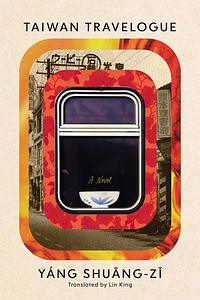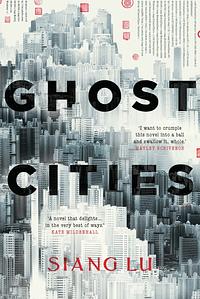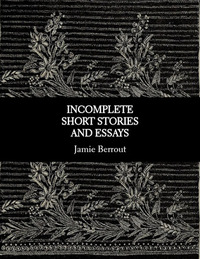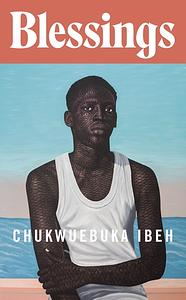Take a photo of a barcode or cover
walaalamageeddow's Reviews (844)
lighthearted
fast-paced
i initially thought it was going to be something else, but then realised that it is from the perspective of the japanese character and i am not interested in the colonizers pov.
medium-paced
In between bites of pie, I called up, texted, or messaged every trans woman I knew who was in as precarious a situation as I was. “Something big is happening,” I told them. “I’m at the end of West Burnside at Jennifer Pretzel’s mansion, and she’s decided to open her doors to all trans people.
What ever you want, it's yours.
....
“Well, what
kind life is waiting for me? Where can I ever get away from this? There’s a
reason why Frida Kahlo’s
face is fucking everywhere and no one knows about Julia Lopez. Even in Mexico you can’t escape it. This violence is everywhere. No matter how I live or what I do, the violence will be there, and if I can’t stand outside or speak my mind or even sit in a parked car and expect to stay alive – then, fuck it, I might as well fight back. By the way, you’re free to leave at any time. Go crawl back to your coffee shop and feed the
unwashed white artists you love so much. I’ll find my own way
back to the target.”
The air is one of paranoia, but it’s the rather ordinary paranoia which accompanies any such accumulation of wealth: the sense that all of this might ultimately be meaningless and therefore that it must be piled on, made grander and more ostentatious, to at least create the semblance of meaning if there is none to be had, to make as if all this won’t someday melt into air.
.....
And there’s the fact – it almost feels rude to remind you, but
it must be said – they gave a prize that same year to Alice
Bailey for a thrilling piece of nonfiction which argues for
us to think of trans women
as sex crazed fetishists that have taken their fantasies way too far. That’s not something to be proud of, probably, but go ahead – revel in it. It’s just a little sad. While you were up on stage getting photographed with the other award winners – you, the trans fiction prize recipient; she, your nonfiction counterpart; and what a
delight to see you both smiling together – there were trans women much older and much younger than you fighting back against Bailey’s pseudoscience bullshit as they had for months. There they were. The few of them who could afford entry getting kicked out of the auditorium for protesting Bailey’s victory. Waiting outside to throw eggs at Bailey and the prize committee, prepared to risk arrest. Hacking Lambda’s
site and filling it with Bailey’s most heinous excerpts. Planning longer term strategies to subvert Bailey’s work and Lambda’s ability to endorse writers that so clearly despise trans women.
[...]
The thing is your novel never measured up to the dead woman’s memoir. By the time she’d sat down to write her story, the woman had lived through the best and worst that
life has to offer. It’s no wonder that her book was perfect, that at the end of her natural life she was able to crystallize her experiences into this gorgeous expression of herself, which moved even you, a person with no other thought but how to merge with the capitalist order, a rat who would devour her own sisters to last one more winter.
....
Every time the ground rumbles or the walls tremble slightly I ask myself – just now, did you hear that? How strange. . . I ask
myself, is that a heavy truck rolling by just outside these
walls, or is it Valeria out there killing you ...... fascists?
What ever you want, it's yours.
....
“Well, what
kind life is waiting for me? Where can I ever get away from this? There’s a
reason why Frida Kahlo’s
face is fucking everywhere and no one knows about Julia Lopez. Even in Mexico you can’t escape it. This violence is everywhere. No matter how I live or what I do, the violence will be there, and if I can’t stand outside or speak my mind or even sit in a parked car and expect to stay alive – then, fuck it, I might as well fight back. By the way, you’re free to leave at any time. Go crawl back to your coffee shop and feed the
unwashed white artists you love so much. I’ll find my own way
back to the target.”
The air is one of paranoia, but it’s the rather ordinary paranoia which accompanies any such accumulation of wealth: the sense that all of this might ultimately be meaningless and therefore that it must be piled on, made grander and more ostentatious, to at least create the semblance of meaning if there is none to be had, to make as if all this won’t someday melt into air.
.....
And there’s the fact – it almost feels rude to remind you, but
it must be said – they gave a prize that same year to Alice
Bailey for a thrilling piece of nonfiction which argues for
us to think of trans women
as sex crazed fetishists that have taken their fantasies way too far. That’s not something to be proud of, probably, but go ahead – revel in it. It’s just a little sad. While you were up on stage getting photographed with the other award winners – you, the trans fiction prize recipient; she, your nonfiction counterpart; and what a
delight to see you both smiling together – there were trans women much older and much younger than you fighting back against Bailey’s pseudoscience bullshit as they had for months. There they were. The few of them who could afford entry getting kicked out of the auditorium for protesting Bailey’s victory. Waiting outside to throw eggs at Bailey and the prize committee, prepared to risk arrest. Hacking Lambda’s
site and filling it with Bailey’s most heinous excerpts. Planning longer term strategies to subvert Bailey’s work and Lambda’s ability to endorse writers that so clearly despise trans women.
[...]
The thing is your novel never measured up to the dead woman’s memoir. By the time she’d sat down to write her story, the woman had lived through the best and worst that
life has to offer. It’s no wonder that her book was perfect, that at the end of her natural life she was able to crystallize her experiences into this gorgeous expression of herself, which moved even you, a person with no other thought but how to merge with the capitalist order, a rat who would devour her own sisters to last one more winter.
....
Every time the ground rumbles or the walls tremble slightly I ask myself – just now, did you hear that? How strange. . . I ask
myself, is that a heavy truck rolling by just outside these
walls, or is it Valeria out there killing you ...... fascists?
funny
informative
inspiring
reflective
fast-paced
i am always in search of stories that are written from an abolitionist perspective which is how I ended up finding this book and the short stories, thoughts, prompts, critical essays gave me what I wanted and so much more!!!
here are some of the passages that stood out to me:
In the end, the two of them become friends, they begin to understand one another, that they aren't so different. Especially that the state is largely responsible
for their misery.
....
The way we use stories to explain things we couldn't otherwise. The way we use stories to make sense
of the experiences that add up to each of our realities.
The way we use stories to search for ourselves and to transforms ourselves and to become ourselves.
....
But the further the show progresses, the more the main
characters realize that the police are the true villains of the city, that they've been working alongside unrepentant, state-sanctioned murderers and their enablers in the courts and prosecutor's office, that these instances of police brutality are pervasive and considered normal or even necessary by the police, that there is no such
thing as a good cop because any cop who tries to help them gets fired, discredited, or killed by the system. And the farther the show goes on, the more danger the protagonists are in because the police and state gradually recognize them as a threat and move to
confront them.
....
In all those years that I was growing up as a girl I could never call myself a
girl. Maybe that's why I use that name so much now and why I need to try it while I can, for myself and other trans girls and their different girlhoods.
....
Then turn the problem on its head – imagine a world in which your problem is not only completely gone but reversed – now you are more than safe and actually can protect others, now changing your name is not expensive or a burden but it’s a real opportunity.
.....
I’m no longer sure if a particular childhood memory is true or if it is based on a dream. Although – and this is the key – I really don’t think distinguishing
between actual events/memories and dreams should matter now. Because either way the longing that’s behind the memory or dream is the same and it’s enough to make everything clear.
.....
Why is it that the characters, sisters in their priestesshood, possess great wealth and can recognize that their wealth exists in contrast to poverty and homelessness, without acting to lift to lift others out of the margins? I'm thinking about the character Marta who volunteers
to “feed the homeless” once a year and afterward rides away on a limo. Doesn't that single act of volunteering aid become
meaningless in light of her excessive wealth; and if it is ugly and condescending then why does the novel praise her rather than be critical? Why do the sisters never have to worry about money; why do they always have apartments (they collectively own significant
amounts of property) and jobs? Why don't the characters wonder about this, and why doesn't the narration (brought to us by a goddess who has lived countless lives) question this?
here are some of the passages that stood out to me:
In the end, the two of them become friends, they begin to understand one another, that they aren't so different. Especially that the state is largely responsible
for their misery.
....
The way we use stories to explain things we couldn't otherwise. The way we use stories to make sense
of the experiences that add up to each of our realities.
The way we use stories to search for ourselves and to transforms ourselves and to become ourselves.
....
But the further the show progresses, the more the main
characters realize that the police are the true villains of the city, that they've been working alongside unrepentant, state-sanctioned murderers and their enablers in the courts and prosecutor's office, that these instances of police brutality are pervasive and considered normal or even necessary by the police, that there is no such
thing as a good cop because any cop who tries to help them gets fired, discredited, or killed by the system. And the farther the show goes on, the more danger the protagonists are in because the police and state gradually recognize them as a threat and move to
confront them.
....
In all those years that I was growing up as a girl I could never call myself a
girl. Maybe that's why I use that name so much now and why I need to try it while I can, for myself and other trans girls and their different girlhoods.
....
Then turn the problem on its head – imagine a world in which your problem is not only completely gone but reversed – now you are more than safe and actually can protect others, now changing your name is not expensive or a burden but it’s a real opportunity.
.....
I’m no longer sure if a particular childhood memory is true or if it is based on a dream. Although – and this is the key – I really don’t think distinguishing
between actual events/memories and dreams should matter now. Because either way the longing that’s behind the memory or dream is the same and it’s enough to make everything clear.
.....
Why is it that the characters, sisters in their priestesshood, possess great wealth and can recognize that their wealth exists in contrast to poverty and homelessness, without acting to lift to lift others out of the margins? I'm thinking about the character Marta who volunteers
to “feed the homeless” once a year and afterward rides away on a limo. Doesn't that single act of volunteering aid become
meaningless in light of her excessive wealth; and if it is ugly and condescending then why does the novel praise her rather than be critical? Why do the sisters never have to worry about money; why do they always have apartments (they collectively own significant
amounts of property) and jobs? Why don't the characters wonder about this, and why doesn't the narration (brought to us by a goddess who has lived countless lives) question this?
Nameless Woman: An Anthology of Fiction by Trans Women of Color
Olive Machado, DM Rice, Venus Selenite, Vita E, Kylie Ariel Bemis, Joss Barton, Jeffrey Gill, Carla Aparicio, Jamie Berrout, Catherine Kim, Serena Bhandar, Emmy Morgan, Ellyn Peña, Gillian Ybabez, Dane Figueroa Edidi, Libby White, Lulu Trujillo, Michelle Evans, Saki, Luvia Montero, Jasmine Kabale Moore, manuel arturo abreu
medium-paced
i got to know the works of so many authors i've never read before and i'm very thankful to the editors that they published this anthology
of the 20 in this anthology here are the stories i dug the most y in the order they appear in the book:
MICHELLE EVANS Excerpt from the upcoming novella No More Secrets (I CANNOT WAIT FOR THIS NOVELLA TO BE PUBLISHED!!!)
Kylie Ariel Bemis, The Sixth World (i enjoyed it, despite romantic love playing a big part)
Venus Selenite, Metropocalypse (the beautiful Black interaction between Bre the Caffeine Dealer and Ms. Teresa the Flower Lady was so so so filling 🖤)
Serena Bhandar, The Root of Echoes
Jasmine Kabale Moore, The Girl and the Apple
manuel arturo abreu, Collecting
Jeffrey Gill, Two Stories (only the 1st Untitled)
Libby White, Back Home: Three Short Stories (only the 2nd Mike Lee & 3rd Under the Lights)
unfortunately there were too many stories that revolved around romantic relationships and although i understand why that is, as we are all propagandized to prioritize and pedestal romantic relationships, it just makes a story often very uninteresting. and when you center romantic relationships u often center whiteness as well, which was the case in almost all the stories that revolved around romance. speaking of centerring whiteness, i left out Dane Figueroa Edidi's story from the list above, because i couldn't get over the fact that she forced that yt man into the story. i loved a lot of things about the story, but that part and the lack of acknowldgment let alone critiquing the ridiculous weslth thr family of the main character seem to have really uined it for me.
i'd definitely tecommend getting into this anthology as you will find at least a few authors who's work you'll fall in love with (lol)
of the 20 in this anthology here are the stories i dug the most y in the order they appear in the book:
MICHELLE EVANS Excerpt from the upcoming novella No More Secrets (I CANNOT WAIT FOR THIS NOVELLA TO BE PUBLISHED!!!)
Kylie Ariel Bemis, The Sixth World (i enjoyed it, despite romantic love playing a big part)
Venus Selenite, Metropocalypse (the beautiful Black interaction between Bre the Caffeine Dealer and Ms. Teresa the Flower Lady was so so so filling 🖤)
Serena Bhandar, The Root of Echoes
Jasmine Kabale Moore, The Girl and the Apple
manuel arturo abreu, Collecting
Jeffrey Gill, Two Stories (only the 1st Untitled)
Libby White, Back Home: Three Short Stories (only the 2nd Mike Lee & 3rd Under the Lights)
unfortunately there were too many stories that revolved around romantic relationships and although i understand why that is, as we are all propagandized to prioritize and pedestal romantic relationships, it just makes a story often very uninteresting. and when you center romantic relationships u often center whiteness as well, which was the case in almost all the stories that revolved around romance. speaking of centerring whiteness, i left out Dane Figueroa Edidi's story from the list above, because i couldn't get over the fact that she forced that yt man into the story. i loved a lot of things about the story, but that part and the lack of acknowldgment let alone critiquing the ridiculous weslth thr family of the main character seem to have really uined it for me.
i'd definitely tecommend getting into this anthology as you will find at least a few authors who's work you'll fall in love with (lol)
dark
emotional
reflective
medium-paced
Plot or Character Driven:
A mix
Strong character development:
Yes
Loveable characters:
Yes
Diverse cast of characters:
N/A
Flaws of characters a main focus:
Complicated
things that bothered me:
- the idea of resistance to enslavement had to come from a being from a different galaxy, not from the enslaved ppl themselves (an alien savior instead of white savior lol)
- choosing to keep almost the entirety of the story in captivation and only the freedom at the end
- the desire to want to depict enslaved ppl being harmful to one another
- the desire to make one of the enslavers as a 'good person' pushing the narrative that 'they weren't all bad'
- the idea of resistance to enslavement had to come from a being from a different galaxy, not from the enslaved ppl themselves (an alien savior instead of white savior lol)
- choosing to keep almost the entirety of the story in captivation and only the freedom at the end
- the desire to want to depict enslaved ppl being harmful to one another
- the desire to make one of the enslavers as a 'good person' pushing the narrative that 'they weren't all bad'
fast-paced









